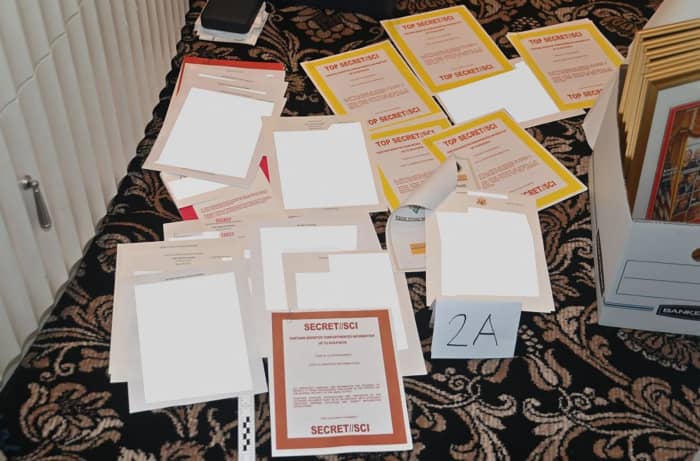The federal criminal indictment against former-president Donald Trump alleging he illegally kept classified documents after leaving the White House reads like a textbook manual on how not to handle top-secret files.
Federal prosecutors from special counsel Jack Smith’s office detail a litany of alleged missteps, willful obfuscation and breaches of security in how Trump stored, shared and even tried to hide from investigators what he had taken with him when he left office in 2020.
On Friday, a federal judge in Florida unsealed the 37-count indictment against Trump on charges of willful retention of national defense information, conspiracy to obstruct justice, withholding a document or record, corruptly concealing a document or record, scheming to conceal and making false statements and representations.
Trump has insisted he is innocent and has vowed to fight in court.
Here are six of the most serious allegations contained in the 49-page indictment:
1. The most secret of secrets
Prosecutors were vague about exactly what kind of classified information was contained in the files Trump allegedly retained upon leaving office, but they did provide broad descriptions of what type of material was there, including sensitive details about national defense.
Other categories included:
- White House intelligence briefings about foreign countries
- Details about the military capabilities of certain foreign countries
- Information on the nuclear capabilities of a foreign country
- Documents detailing communications with the leader of a foreign country
- Military contingency planning by the United States
- Details of U.S. nuclear weapons
- Documents detailing plans of an attack in a foreign country
2. Don’t mind those boxes
Prosecutors allege that Trump was extremely careless in how he stored dozens of boxes which contained hundreds of classified documents that he took with him from the White House to his residence at the Mar-a-Lago social club in Palm Beach, Fla.
At various points over the two years Trump kept the papers, the boxes were kept on a stage in a public ballroom, in a bathroom and shower, his home office, his bedroom and an unsecured storage room adjacent to a closet where bottles of liquor were stored.
In one episode, a Trump staffer found a stack of boxes had fallen over in the storage room, spilling documents marked as classified onto the floor.
3. Hey, check these out
On at least two occasions, Trump showed off certain classified documents to people who lacked any kind of security clearance, including a writer working on a book and a representative of a political action committee.
In July 2021, prosecutors say Trump whipped out a classified document detailing a proposed plan of attack on a foreign country.
“Look what I found, this was [the senior military official’s] plan of attack, read it and just show … it’s interesting,” Trump was recorded as saying, according to the indictment.
“It is like, highly confidential,” he allegedly said. “Secret. This is secret information.”
Two months later, Trump allegedly showed a classified map of a foreign country where fighting is ongoing to a representative of his political action committee. Trump noted that “he should not be showing the map,” and warned the official “not to get too close.”
4. Can’t we just keep this stuff?
After receiving subpoenas demanding he return all the classified material he had taken with him, Trump asked his lawyers if they could just not send it all back, or tell the government that they went through all the boxes and hadn’t found anything.
“Well, what if we, what happens if we don’t respond at all or don’t play ball with them?” Trump is quoted as saying by federal prosecutors.
“Wouldn’t it be better if we just told them we didn’t have anything here?” Trump asked, according to the indictment.
“Well look, isn’t it better if there are no documents?” he further asked, the court documents claimed.
Later, after Trump’s lawyers had gone through the boxes and uncovered dozens of classified documents, Trump allegedly asked if they could just make anything really damning disappear, the court filing said.
“He made a funny motion as though —well okay, why don’t you take them with you to your hotel room and if there is anything really bad in there, like, you know, pluck it out. And that was the motion he made. He didn’t say that,” one of the lawyers, who was not named in the filing, was quoted as telling prosecutors.
5. Documents from many sensitive agencies
The documents investigators recovered came from a wide gamut of U.S. government agencies, the indictment said, including:
- The CIA
- Department of Defense
- The National Security Agency
- The National Geospatial Intelligence Agency
- The National Reconnaissance Office
- The Department of Energy
- The Department of State
6. If my lawyers don’t know about it …
Prosecutors say that Trump purposefully worked with his personal valet to hide boxes of documents from his own lawyers as they worked to return classified material to the government.
During a 10-day period in the late spring of 2021, prosecutors say Trump’s valet, Waltine Nauta, moved 64 boxes from a storage room to Trump’s office for him to go through before his lawyers could examine them. Prosecutors say Nauta later moved just 30 boxes back to the storage for the lawyers to sift through. Some of those boxes were later sent to Trump’s other home in Bedminster, N.J.
Nauta has also been charged with conspiracy to obstruct justice, withholding a document or record, corruptly concealing a document or record, concealing a document in a federal investigation, scheming to conceal and making false statements or representations.







